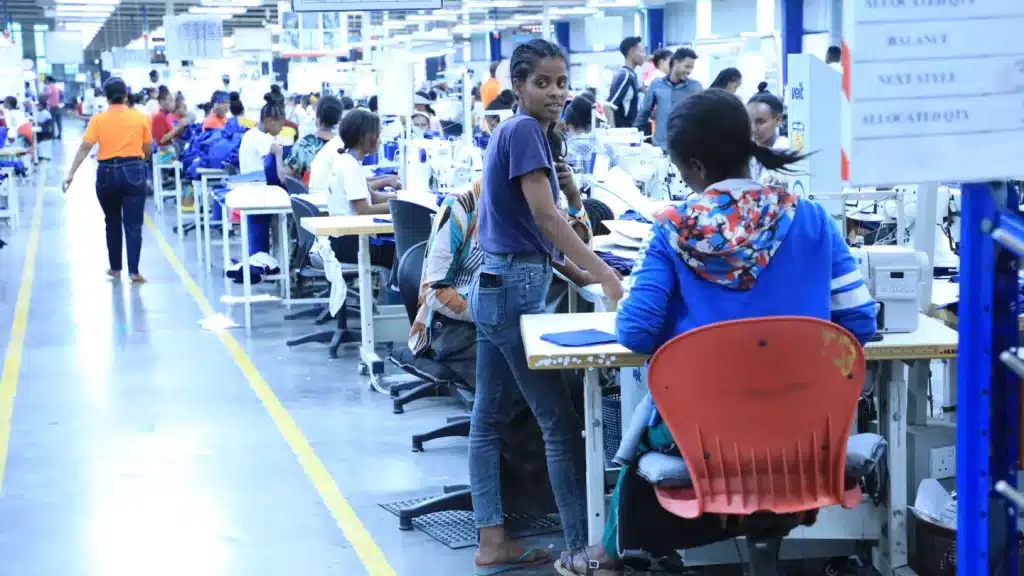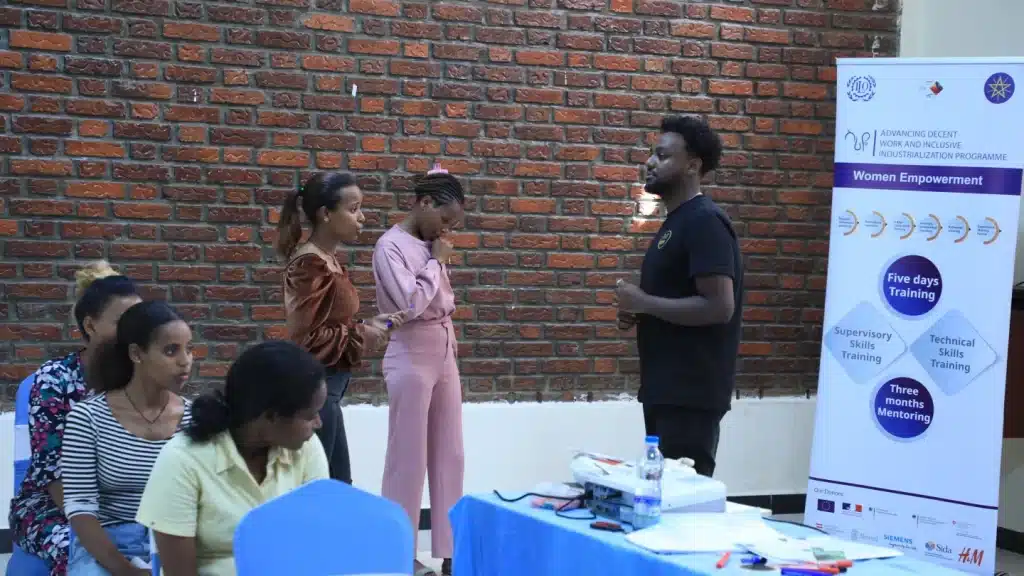A Better Work initiative is transforming Ethiopia’s garment sector by empowering women workers to step into leadership roles. Through targeted training and mentorship, the programme has seen remarkable success—70% of its trainees have been promoted. By building confidence of women workers, improving kills, and opening doors to new opportunities, the initiative is not only advancing careers but also reshaping the future of workplace equality in the industry.
Hawassa, Ethiopia – A growing number of women in Ethiopia’s garment sector are moving from operational roles to leadership positions, thanks to ILO/IFC Better Work’s Women Leadership Development Programme (WLDP). Since its launch in 2021, the programme has trained over 234 women, with an average of 70% promoted to supervisory roles—a milestone that marks significant progress in promoting workplace equality and inclusive industrial growth. In addition, out of 178 senior supervisors who served as mentors, 10 were promoted to middle-level leadership positions.
The programme’s holistic approach—combining classroom learning, practical exercises, and sustained mentorship—is helping women workers move from factory floor roles to leadership positions across Ethiopia’s industrial parks. Participating factories have seen improved line efficiency, higher product quality, and absenteeism, while women workers have developed critical skills in decision-making, conflict resolution, communication, influencing, problem solving skills and planning skills.
At JP Garment, Azeb Abraham, an Industrial Engineering Executive, described how the programme accelerated her professional growth:
“Before the training, I struggled with communication and lacked self-confidence. After completing the ILO’s Leadership and Technical Skills training, I now take the lead, communicate clearly, and lead my team with confidence,” said Azeb. “As a mentor, I coached three women workers, and one of them was promoted from jumper to line supervisor—an achievement that improved her career and salary. This training doesn’t just change your work life; it transforms your personal life too.”

At Indochine Garment, Mekdes Alamu shared a similar experience:
“The Leadership and Technical Skills training helped me sharpen my production skills, minimize product waste, improve my punctuality, and operate multiple machines,” said Mekdes. “It’s not just about technical growth—the training improved my communication skills, teamwork, and confidence. I hope more workers get this opportunity.”
In addition to trained women workers, mentors are central to the success of WLDP. Firew Eshetu, an IE Executive at Indochine Garment, reflected on his experience coaching women workers:
“Before the training, I viewed my job simply as a means of income. But through the ILO’s training, I discovered my ability to lead and support others, enhanced my communication, time management, and problem-solving skills. said Firew. “Mentoring helped me grow personally and professionally. I believe expanding this training would significantly boost productivity and employee’s satisfaction.”
Through the ILO’s training, I discovered my ability to lead and support others, enhanced my communication, time management, and problem-solving skills
Coordinating the programme’s fourth round at Indochine Garment, Health and Safety Executive Aster Kebede noted the wide-ranging impact:
“The training and mentorship approach empowered participants to grow in their careers and personal development”, said Aster. “It’s a rewarding experience to see mentees progress— and coordinating the programme helped identify my own areas for improvement and strengthen my skills.”
A Pipeline for Inclusive Leadership
To strengthen collaboration and knowledge sharing among trained women leaders, there is a need to establish framework for women leaders from all cohort to connect, support one another. The WLDP was launched as a flagship component of the ILO’s Better Work programme, which promoted better jobs and more equitable workplaces in Ethiopia’s industrial parks and concluded in May 2025. In addition to training women workers, the initiative builds factory-level coaching and mentorship by training mentors—often senior supervisors and HR professionals—who provide ongoing guidance and foster a culture of inclusive leadership.
Building on this momentum, the Programme is now preparing to launch a Women Leaders Network in Hawassa and Addis Ababa. The network will connect graduates of the WLDP across Hawassa and Bole Lemi Industrial Parks in both cities, creating a dynamic platform to: foster mentorship and peer learning; elevate the visibility of women leaders; promote collaboration across factories and support women’s career advancement and leadership growth.
This exciting initiative marks another significant step toward empowering women and strengthening inclusive leadership across Ethiopia’s industrial landscape.
The programme’s reach is also expanding beyond the garment sector. It has recently extended into horticulture and partnered with the Ministry of Industry to roll out similar Women Leadership Development Programme in eight additional enterprises, seven of which are women-owned. This expansion highlights the programme’s adaptability and relevance across Ethiopia’s broader industrial development.

Measurable Impact, Growing Demand
“The impact of the WLDP is both measurable and deeply personal,” said Tigist Fisseha, Team Leader, ILO Better Work Ethiopia. “We are not only increasing productivity on the factory floor, but helping women unlock their full leadership potential—transforming lives, workplaces, and communities.”
As the fifth round of training unfolds, and with preparations for the Women Leaders Network underway, the WLDP continues to demonstrate how targeted skills development, mentorship, and inclusive practices can empower women and accelerate Ethiopia’s industrial transformation—one leader at a time.